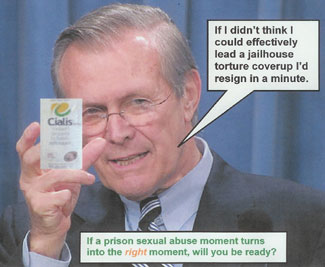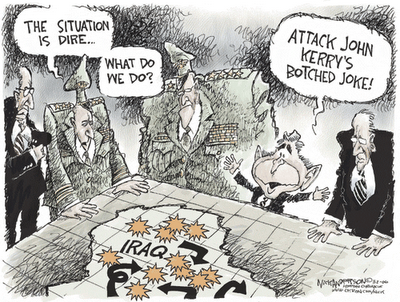
Donald Rumsfeld is out. Why did he leave? Days ago, the president told reporters that he would retain Rummy through the end of his presidency. That implied that Bush wanted Rumsfeld in the job no matter what happened on Election Day and that he believed Rumsfeld was essential to protecting this nation's security. So is this a political decision? After all, how could this administration play politics with such an important position? It wouldn't do such a thing, would it?
Asked at a press conference about the contradiction between his statement of support for Rumsfeld last week and today's announcement, Bush tried to explain it away by noting that Rumsfeld's departure was not finalized until yesterday. That would mean that he told those reporters he was keeping Rumsfeld at the Pentagon for another two years at a time when Rumsfeld's exit was already in the works.
Bush was also asked if Rumsfeld's replacement by former Robert Gates, who was CIA chief for Bush's father, would lead to a "new direction." He said, "I am committed to victory." Pressed on the "new direction" point, he said that Gates would bring in a "fresh perspective." Let's see if (a) he does and (b) that "perspective" changes anything at 1600 Pennsylvania Avenue.
In the meantime, yet more election analysis from yours truly, courtesy of www.tompaine.com:
Democratic To-Do List
David Corn
November 08, 2006
www.tompaine.com
"I hope they don't get it."
A veteran Democratic strategist, standing outside the Democrats' victory party in a Capitol Hill hotel ballroom, was talking about the Democrats and the Senate. The best outcome, he said, was for the Democrats to win back the House--which by this point on Election Night they had--and become the insurgents of Washington, challenging the discredited and sclerotic Republicans of the White House and Senate. With the House in hand, the Democrats would be able to pass popular pieces of legislation--say, raising the minimum wage--and mount whatever investigations they desire. The bills would then be killed by either GOPers in the Senate or the lame duck in the White House. The Democrats would have no true responsibility for governing--that is, for cleaning up George W. Bush's mess in Iraq and elsewhere. But if they were to end up controlling both chambers of Congress, they would become fifty-fifty partners in the government--become the target of a president who would use Democratic control of Congress as an excuse for his own failures and endlessly blame the Democrats for the nation's woes. "One-third is ideal," this strategist remarked. Moments later, the wife of another prominent Democratic strategist told me her husband also wasn't wishing for success in the Senate.
Well, these Democrats may have to settle for both houses of Congress. As I write on the morning after, the Democrats are leading in the not-yet-settled Senate races of Montana and Virginia. If these numbers hold--and it seems that there will be a recount in the James Webb versus George Allen race in Virginia--the Democrats will indeed have the obligation to run the legislative branch. And they will have a rather narrow window in which they can attempt to re-brand themselves as the responsible party of Washington.
Democrats know that this election was more about Bush than them. They won mostly because they were not the other guy. Americans didn't flock to the polls because they yearned to see Representative Nancy Pelosi as House speaker or Senator Harry Reid as Senate majority leader. They wanted Bush out of the White House. But since he was not on the ballot, voters went with the next best thing: booting his comrades out of Congress. So the Democrats--even though they did campaign on a platform promoting various legislative initiatives--take office without a full mandate. But with this win comes the chance to persuade the American public that Democrats do stand for something, do share the values of many Americans and can get the job done. Yet the Democrats will have the political equivalent of ten minutes to prove this.
That's not an impossible task, but there are obvious obstacles. Foremost is the conservative, pro-Republican media attack machine. By the time you read this, the right-wing media will probably be intensifying its campaign to demonize Pelosi and the other Democrats who will assume leadership positions or committee chairmanships. Remember, when Newt Gingrich and his allies took power in the House in the so-called Republican revolution of 1994, the conservative media infrastructure was not nearly as large and as integrated with the GOP as it is today. Now, Mission One for this system is to discredit Pelosi and her fellow Democrats. So expect a ceaseless the-end-is-near attack from this gang.
The other obvious obstacle is Iraq. In their victory speeches on election night, Pelosi, Reid, Representative Rahm Emanuel, the head of the Democratic Congressional Campaign Committee, and Senator Chuck Schumer, the head of the Democratic Senate Campaign Committee, each said the election signaled that the American people crave a course correction in Iraq. Yet the Democrats offer no clear alternative path. Though most tend to favor phased disengagement, they do not agree on how to do this. There will be great pressure on the Democrats to solve the problem Bush created in Iraq--even when there are no good or easy solutions. A failure to craft a coherent and convincing alternative for Iraq could quickly hobble the newly empowered Democrats.
The good news is this: In the House, they can start approving legislation immediately and can initiate investigations. Pelosi has already promised that within the first hundred hours, her Democrats will approve bills that raise the minimum wage, increase funding for homeland security, lower interest rates on student loans and permit the government to negotiate with pharmaceutical companies to lower drug prices. If she pulls this off--with or without a Democratic Senate (where opposition party members can easily block legislation)--she will be able to demonstrate to the public that the Democrats are serious and worth supporting.
She will also have to make certain that the Democrats proceed with the appropriate inquiries. The goal is to hold the Bush administration accountable without appearing vindictive. (See Newt Gingrich and Tom DeLay for a lesson in how not to do this.) My hunch is that many Americans--especially those outside the party faithful whom the Democrats will want to keep on their side for 2008--will prefer to see Democrats producing legislative accomplishments rather than acrimonious investigations. But there are plenty of probes that can proceed. Representative Henry Waxman, the new chairman of the government reform committee, should investigate thoroughly the failed reconstruction in Iraq. An estimated $45 billion of the $80 billion spent on Iraq reconstruction has gone down the drain of fraud and waste. What taxpayer would not like to see this fully investigated?
Pelosi and the Democrats--including those in the Senate, if they gain control there--ought to pick their investigations carefully and strategically. (Yes, this means staying away from any talk of impeachment.) But a prudent approach will hardly limit the opportunities. Take global warming. An investigation of how the Bush administration has suppressed scientific data showing the problem of global warming, coupled with hearings on the administrations refusal to do anything significant to redress this threat, could play well.
Let's face it: Pelosi and Reid are not the best media representatives for the Democrats. Democratic representatives and senators routinely hail each for effectively leading their party caucuses, even as they acknowledge these leaders' limitations as the party's spokespeople. And Pelosi is going to have to continue to keep her party together and disciplined on strategy and tactics--traditionally not an easy task for Democrats. (To take advantage of this moment, liberal and conservative Democrats are going to have to play nice with each other.) Pelosi and Reid get credit for the wins on election night, but neither of them is going to sell the Democratic Party using charisma and charm. They can only do so with substance. And many American voters will not grant them much more than a first impression. The Democrats have a shot at winning over the public. But there's a lot they're going to have to get exactly right.
Posted by David Corn at November 8, 2006 01:11 PM











